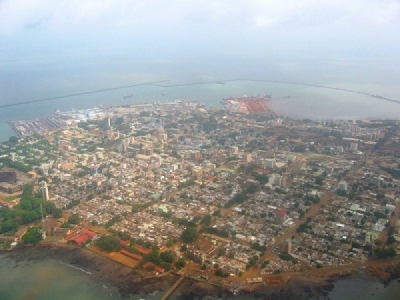
Posted on November 3, 2016
By Janne Suokas, gbtimes
China Harbour Engineering Company (CHEC) has reportedly been contracted by Guinea’s government to upgrade the port in the country’s capital Conakry, marking another major deal for the Chinese company that has been blacklisted by the World Bank.
Under the US$774 million contract, CHEC will construct docks, roads and other infrastructure in the port which is one of the largest in West Africa and handles almost all goods shipped to Guinea and some neighbouring countries like Mali, the Global Times reported on Sunday.
Employing thousands of people in infrastructure projects across the world, CHEC is a subsidiary of state-owned China Communications Construction Company (CCCC) which has been debarred by the World Bank under its fraud and corruption sanctioning policy since January 2009.
According to the World Bank (pdf), the sanctions make “any firm directly or indirectly controlled by China Communications Construction Company Limited” ineligible to be awarded “contracts under a World Bank Group -financed or -executed project related to roads and bridges” until January 11, 2017.
But the contract for upgrading the port in Guinea, which the Global Times says will help CHEC’s long-term development in West Africa, again suggests that the blacklisting by the Washington-based development bank has had little impact for the Beijing-based company when it comes to getting projects financed from other sources.
CHEC and other China Communications Construction Company subsidiaries such as CCCC Dredging were among the Chinese firms contracted for major infrastructure projects agreed during Philippine President Rodrigo Duterte’s visit to Beijing earlier in October.
Deals secured during Duterte’s visit, which was aimed at improving the Philippine’s ties with China after heightened tensions over disputes in the South China Sea, included US$15 billion worth of Chinese investments into transportation, energy and other infrastructure projects in the Philippines over the next five years.
CHEC will be involved in several of these projects, including the Subic-Clark railway project, the Davao coastline and port development project, and the Manila Harbour Centre reclamation, according to the Philippine Daily Inquirer.
Other landmark projects that CHEC has been undertaking throughout Asia, the Middle East, Africa and Latin America in recent years include building South Asia’s largest port in Sri Lanka , constructing a major highway in Zimbabwe, and expanding the national airport in Guyana.
“Inherited” blacklisting
CHEC did not respond to gbtimes’ emailed questions about the World Bank’s debarment – which will be lifted just after two months from now – and whether it has had any repercussions for the company.
But the World Bank sanctions issue has surfaced from time to time over the years, prompting CHEC to claim in 2012 that its parent company (CCCC) “inherited” the blacklisting when it took over a another Chinese company in 2005 that had been sanctioned for collusive practices in a World Bank-funded project in the Philippines in 2002.
“CHEC is not involved in and has never been involved in any activity that has attracted any sanctions by the World Bank,” the company told the Georgetown, Guyana –based Stabroek News.
Those criticising deals signed by governments with companies debarred by the World Bank often cite the bank’s list of Debarred & Cross-debarred Firms & Individuals, which currently includes 815 firms and individuals from countries around the world.
There are 40 Chinese companies on the list – including China International Water & Electric Corporation which began building a 550-megawatt hydropower project in Guinea late last year – compared to 42 from the United Kingdom, 41 from the United States, 38 from Peru, and 34 from Indonesia.
Canada dominates the World Bank’s list with 118 firms, almost all of which are subsidiaries of SNC-Lavalin that were included on the list after a bribery investigation into the Padma Bridge project in Bangladesh in 2013.
Source: gbtimes





